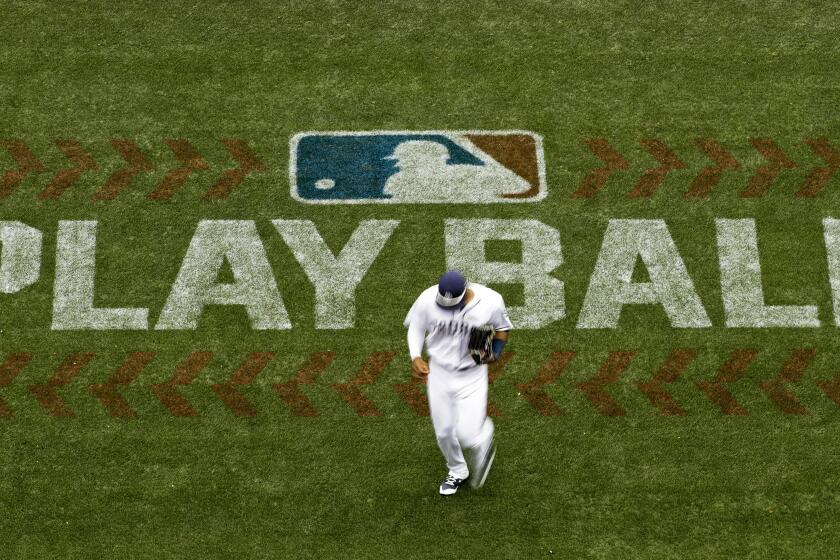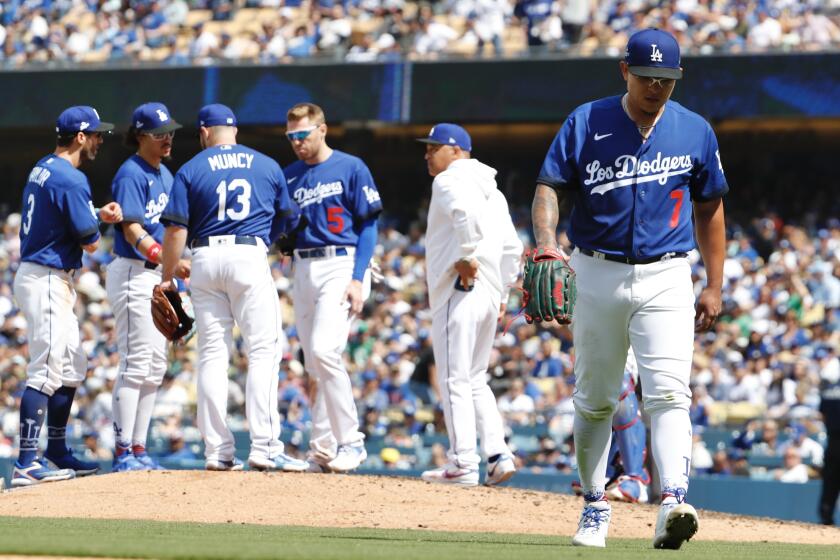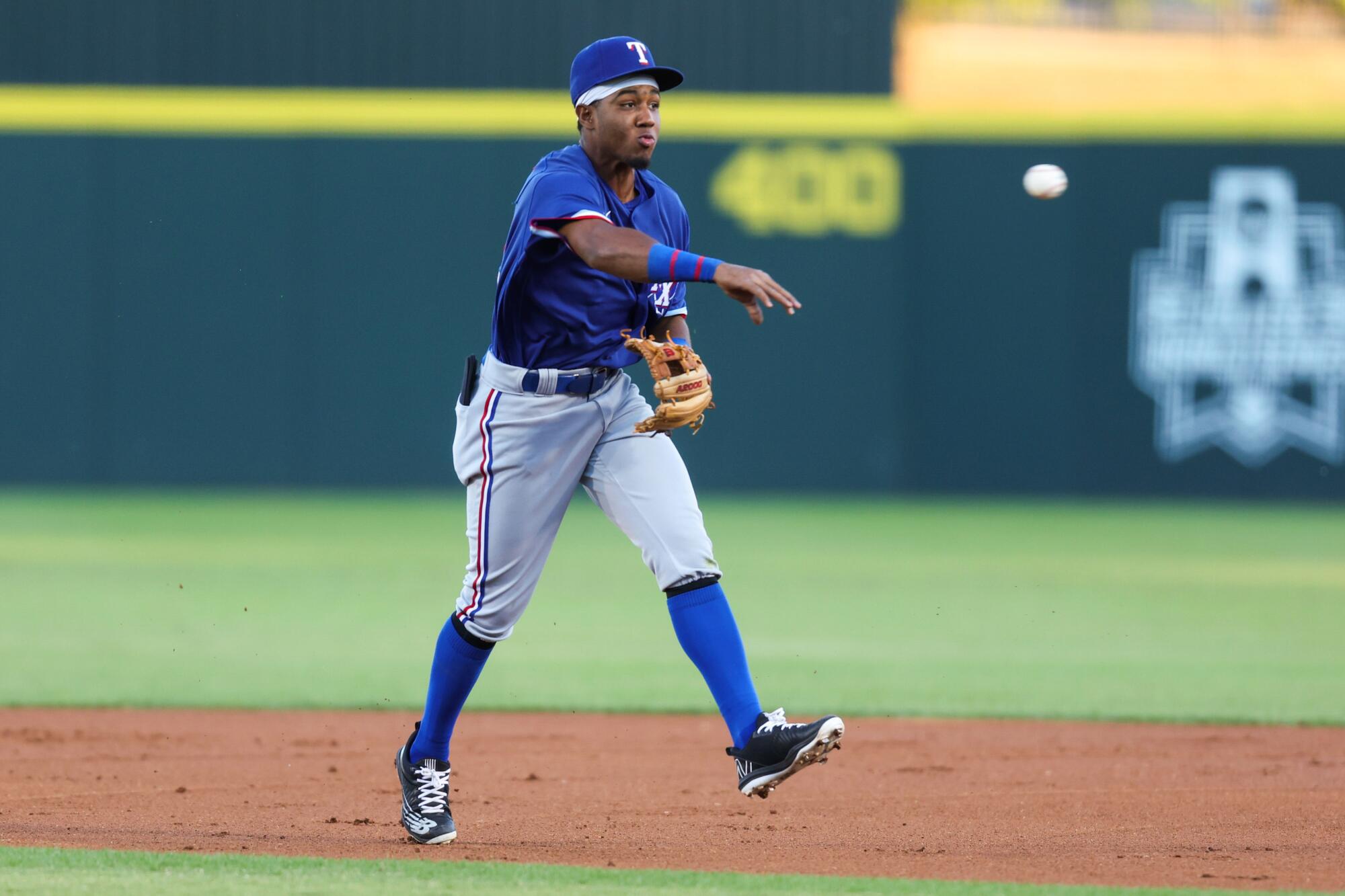
- Share via
This might not be the best time to tell the story of a new sports betting venture, not when the name of baseball’s biggest star just surfaced amid a federal investigation into illegal bookmaking.
But, in the week after betting lines scrolled beneath Shohei Ohtani on ESPN as he said he had never bet on sports, and at the opening of another season in which Major League Baseball has awarded “official sports betting partner” status to multiple sponsors, and at a time the league itself runs a social media account that bills itself as “your source for baseball trends, odds, futures, props, contests and fantasy,” why not?
The pitch here is not an in-your-face advertisement for sports betting, in that big letters and bright lights and “Bet Now!” kind of way. The pitch here is that players can have a financial need and fans can help them solve it.
Not all players are millionaires, and the riches usually do not kick in until a player spends a few years in the major leagues, if he ever does. If a player signed for a relative handful of dollars, and if he cannot afford the elite offseason training necessary to keep up with his competition, what can he do?
A generation that was supposed to have dismissed baseball has found its way back to it. Baseball isn’t dying, but it could have been. Its revival required a game plan.
“It’s hard to generate the capital you need to really focus on baseball year-round, if you’re not a top prospect,” Rob Connolly said.
Connolly is here to offer that capital, with a catch.
He runs Finlete, a new enterprise in which fans can invest in players, in exchange for a percentage of their future earnings. If a player never makes the majors — and most don’t — the player keeps the money and owes nothing. All the while, the fan has a rooting interest and a financial interest in the player.
If the concept sounds familiar, you might be thinking of Big League Advance, a company that also offers money to players now in exchange for a percentage of any MLB earnings.
“It’s the exact same principle as ‘Shark Tank,’ ” said Michael Schwimer, the former major league pitcher who founded BLA.
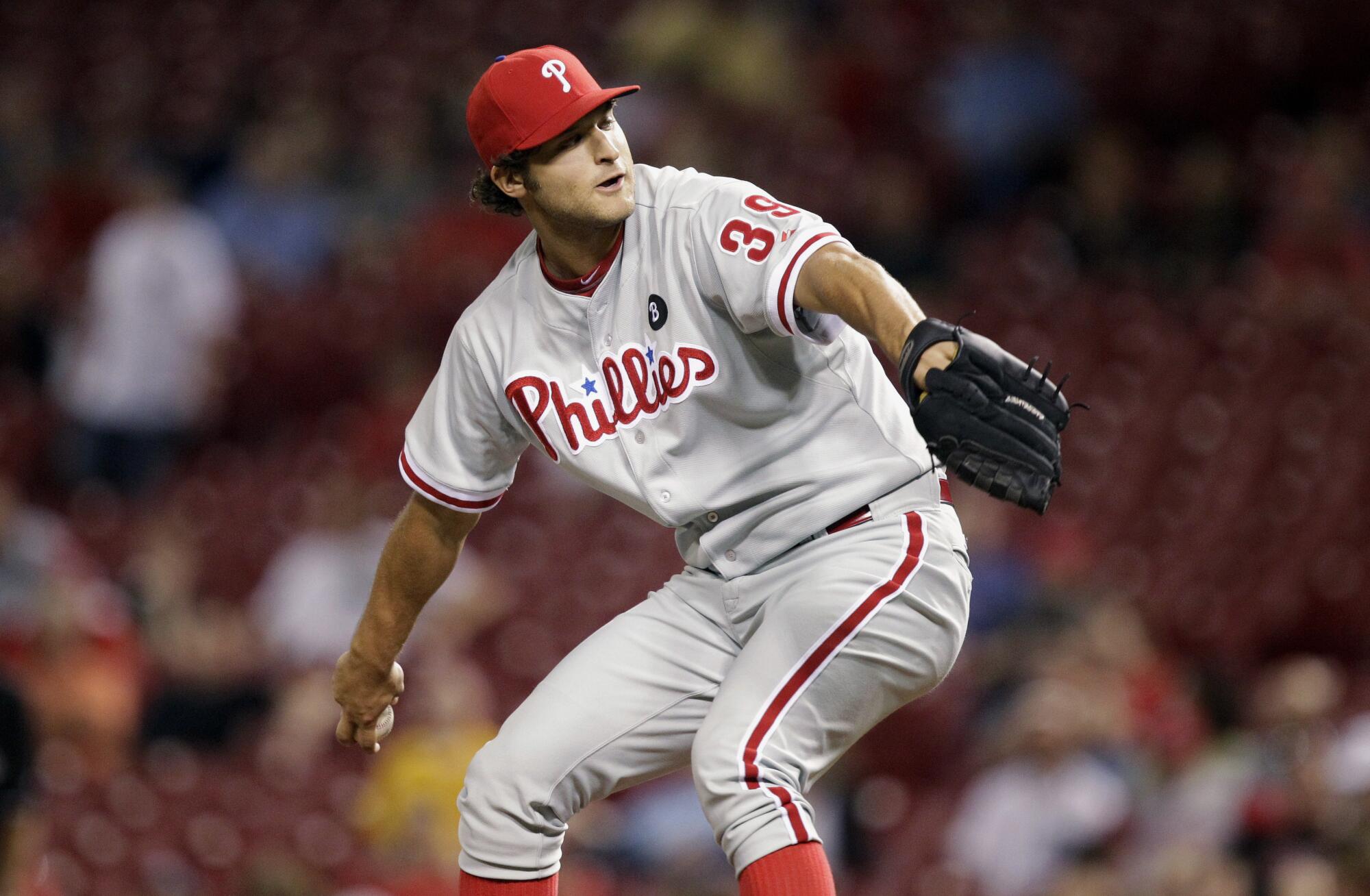
The company, now rebranded as Big League Advantage, hit it big in terms of money and notoriety in 2021, when the San Diego Padres signed BLA client Fernando Tatis Jr. to a $340-million contract. It is unclear how many millions BLA clawed from that contract.
Although players control their own financial decisions, MLB commissioner Rob Manfred said he is uncomfortable with the kind of deals BLA and Finlete offer.
“The mismatch between outcome and cash outlay and ultimate earnings has always bothered me because of the inefficiency,” Manfred told me. “Sometimes the player gets cash upfront and turns out not to be that player. That means a guy who is not a major leaguer is taking economic value out of the industry that probably shouldn’t have received it.
“Conversely, a player takes a discount in order to get some money upfront and, when he hits it big, somebody else is benefiting from that contract. I don’t like the mismatch in either direction.”
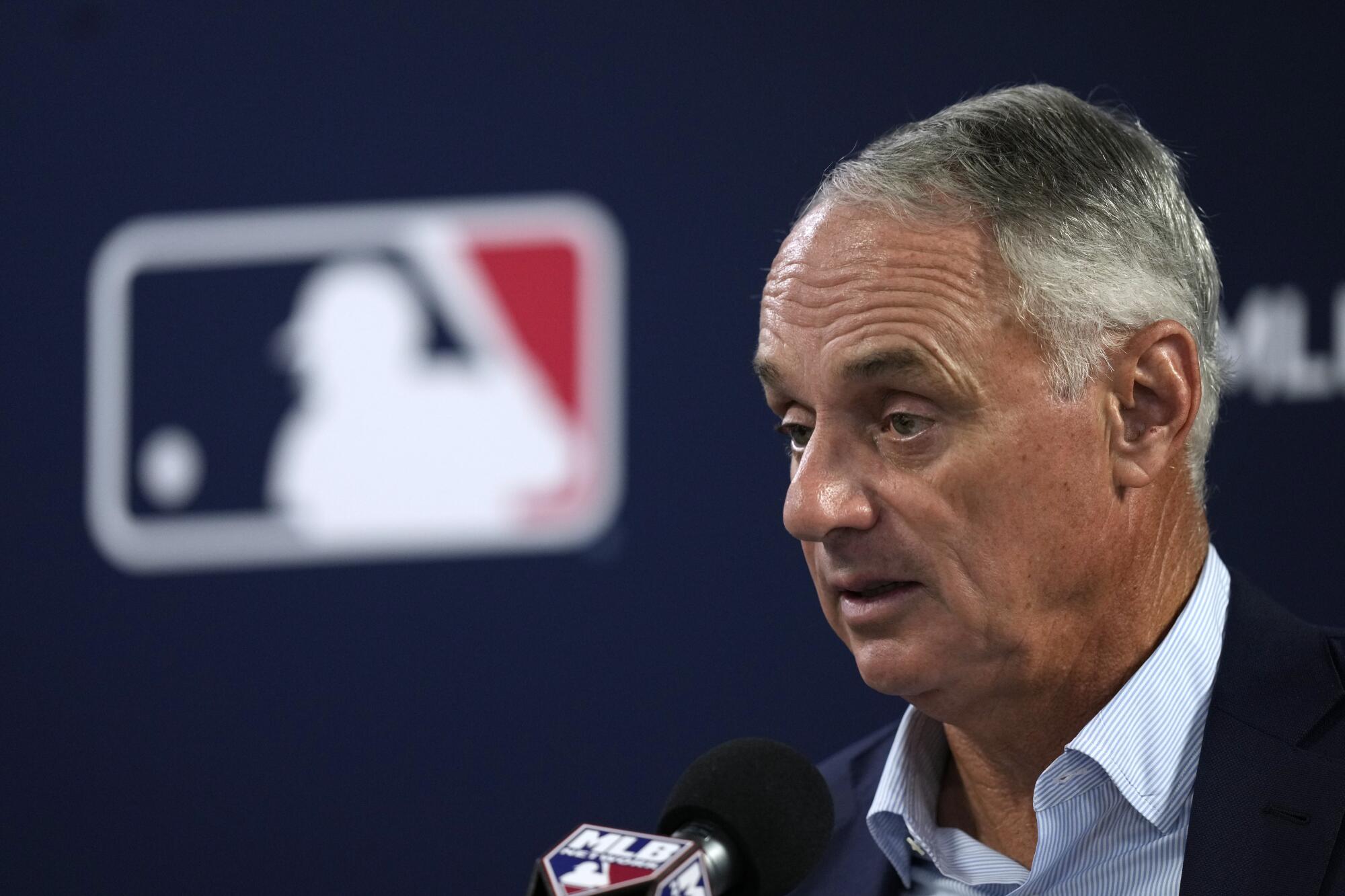
If you can bet on a player’s success, what is the difference between betting on how many home runs a player will hit — as MLB promotes — and betting on his career?
“The big difference is: The house is, depending on how the bets are done, either the industry or the player,” Manfred said.
“Caesars is in the business of taking that risk. My concern is that the player is making a judgment about taking money upfront and effectively making a wager that he could be a big loser on, and he is not in the business of taking bets.”
Connolly and Schwimer scoff at that apprehension, each saying he welcomes agents, attorneys, financial advisors and family members to review any proposed deal on behalf of a player. Schwimer said the majority of players reject a deal with BLA, but more than 400 have signed one.
With Finlete, if you root for the Dodgers, you could support a Dodgers prospect. With BLA, high-powered investors put money into a fund, with no control over which players might get the money.
Some players want the money for training, Schwimer said, but some want to network with investors that could become advisors or business partners.
One player from the Dominican Republic used his money to buy six bulls for breeding, Schwimer said. In a testimonial on the BLA site, Angels pitcher Andrew Wantz — signed for a $10,000 bonus — said he wanted money to buy an engagement ring and pay off student loans.
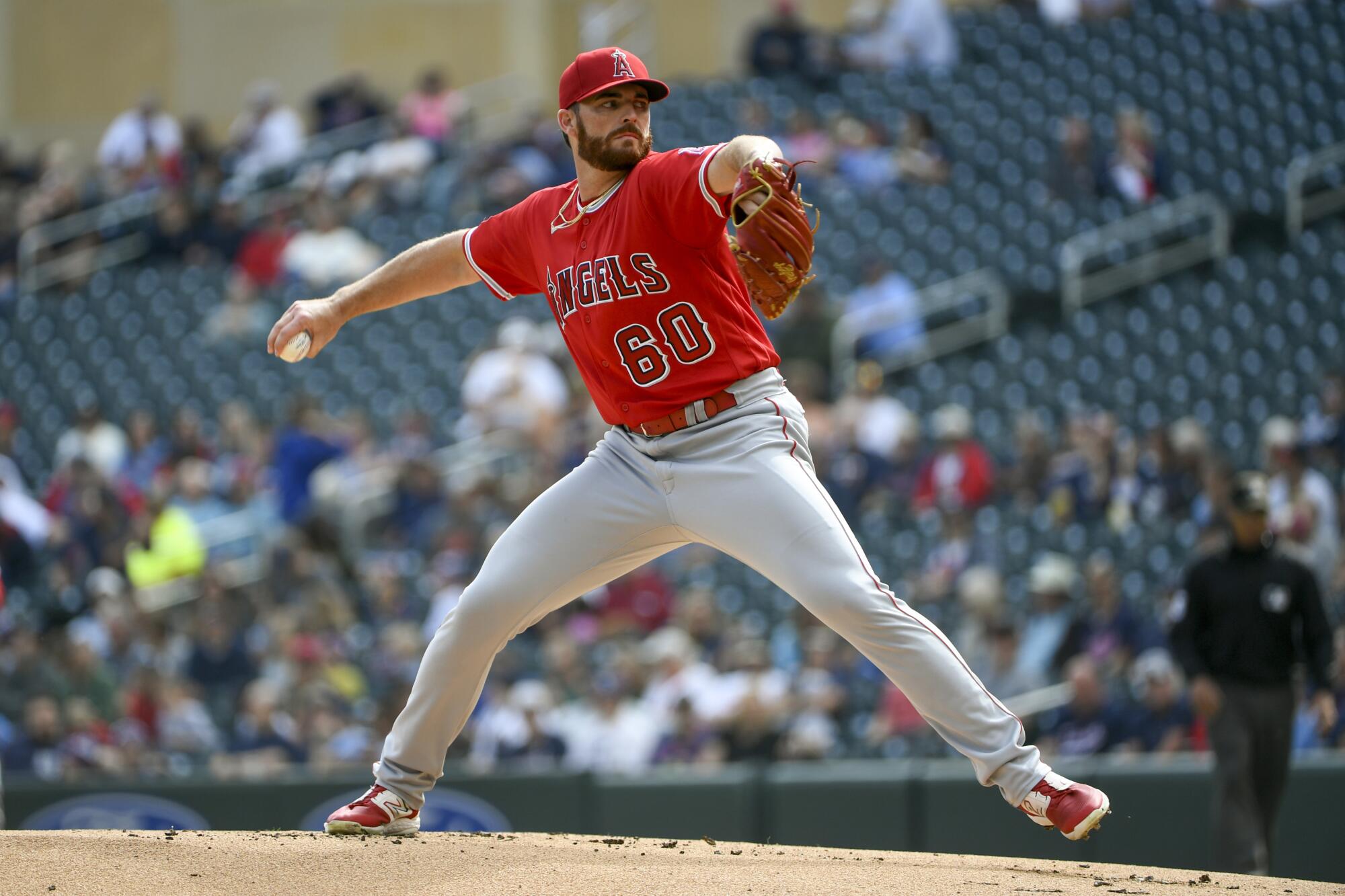
The Finlete model is designed to appeal to the common fan. The company sells “shares” of a player as if he were a stock. You can buy shares in the first Finlete player, Texas Rangers prospect Echedry Vargas, for a minimum investment of $96.
Vargas signed for a $10,000 bonus. Finlete put shares of Vargas on sale Feb. 27 and had raised $21,112 as of Thursday morning, with a target minimum of $50,000 and maximum of $800,000.
Finlete keeps 37.5 cents of every dollar invested, according to the offering memorandum, with the rest going to Vargas. If the company raises $50,000, he would get $31,250. If the company raises $800,000, Vargas would receive $500,000. Investors would divide 10% of any major league salary.
That assumes Vargas, ranked as the Rangers’ No. 17 prospect by Baseball America, makes the majors and stays awhile. To break even on a $500 investment, Connolly said, would require Vargas to reach $8.8 million in career MLB earnings.
That basically means Vargas would have played at least the three years necessary to qualify for salary arbitration, and that is unlikely.
Vargas, signed out of the Dominican Republic, was not drafted. With MLB teams now limited by spending pools, international signing bonuses more closely resemble the bonus structure of players selected in the annual draft, which is limited to players in the United States, Canada and Puerto Rico. And, according to draft data collected by the Society for American Baseball Research, players without six- and seven-figure signing bonuses rarely reach the arbitration threshold.
According to SABR, less than half of players drafted in the first round play three years in the majors, and the chances drop significantly from there: 1 in 3 if drafted in the second round; 1 in 5 if drafted in the third through fifth rounds; 1 in 10 if drafted in the sixth through 10th rounds; 1 in 20 if drafted from the 11th through 20th rounds.
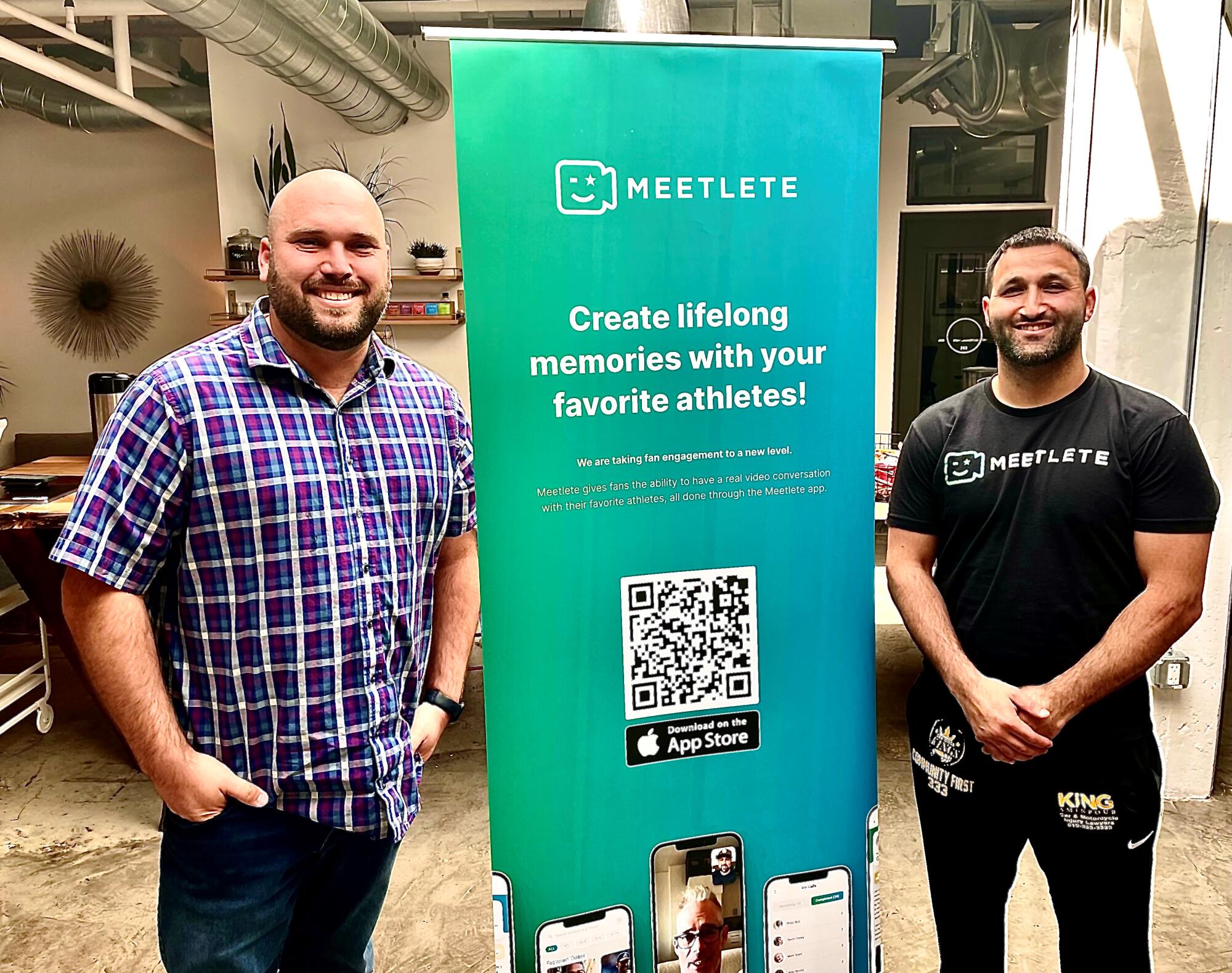
Connolly said he is targeting prospects within and just outside the top 100 in baseball, not so much the ones who got million-dollar bonuses as much as the ones who got small bonuses and started to climb the prospect charts. He said he plans to unveil deals with several other prospects once the Vargas funding is largely complete.
It remains unclear whether former Dodgers All-Star Julio Urías will ever pitch in the majors again as he awaits a decision on potential misdemeanor charges.
“We believe we are giving fans the ability to share in the journey with these prospects,” Connolly said.
The concept of turning athletes into investments is not new.
“In every instance, the core idea is largely the same: take investment concepts core to Wall Street and combine them with the affinity fans have for sports,” Front Office Sports reported last month. “In virtually every prior instance, an inability to reach large swaths of casual fans has helped prove fatal.”
Perhaps Finlete will be different. In an era when sports betting is rampant, why not?
“I might drop $100 on a weekend playing Fanduel, or buy a $100 pack of baseball cards looking for a rookie card,” Connolly said. “I feel like Finlete just fits in there somewhere.”
More to Read
Sign up for This Evening's Big Stories
Catch up on the day with the 7 biggest L.A. Times stories in your inbox every weekday evening.
You may occasionally receive promotional content from the Los Angeles Times.

